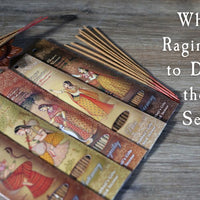Ever had the craving to listen to music that can just scoop up your soul and carry you to a blissful world where its melody absorbs you, even just for a moment? A ragini does just that.
had the craving to listen to music that can just scoop up your soul and carry you to a blissful world where its melody absorbs you, even just for a moment? A ragini does just that.
A ra-what, you ask? Little known in the West, a ragini is a distinct part of the ancient Vedic musical system that evolved in India along with the development of Tantra centuries ago. The melodic expressions of the distinctly feminine raginis create unique moods—most often romantic in one way or another—that uplift the feeling in the air and transform the atmosphere for the benefit of whoever’s listening.
Now get ready to wrap your mind around what is really unusual about this musical system. A ragini is female and has a husband. Yes, we’re still talking about a type of music. Let‘s take a step back and explain. Raginis are the feminine extensions of ragas, which are melodies that originated in the Hindu scriptures. The ragini (which, remember, is a specific type of music that is either sung or played on an instrument) is personified as the wife of a specific raga, and is only performed after her husband, the corresponding masculine raga. Every raga and ragini has a certain time of day when it can be played, and some even have a season, which aligns with its mood.
Ragas had already been around since ancient times but it was the raga-ragini system that evolved from Tantra, a branch of Hinduism that worships the female and male energies. Reflecting the tantric elements of the static (male) and dynamic (female) energies, music carrying mood-evoking vibrations was naturally created. The sounds that fill the air mystically color the mind with their distinct hues and notes, transforming the listener’s mood to align with the musical expression, which more often than not brings the soft air of romance, longing for one’s loved one, playfulness, love, and so on.
Reaching the chakras
But this isn’t all. What many people don’t know is that the vibration of the seven notes of the Vedic music system reach our energetic centers in our astral bodies known as chakras, specifically the seven main ones that align with our central axis. Each one of the Vedic music system’s seven notes represent one of these chakras, which are often blocked or not functioning to their full potential for one reason or another, creating imbalances on the physical, emotional and spiritual planes. The vibrations from the seven Vedic notes can positively influence the chakras, helping to create internal harmony.
Meet the raginis
One of the most well-known raginis is Ragini Deepika, a melody deemed fit for royal lovers and only played after sunset. In Indian art, Ragini Deepika is often portrayed with her vina—a Vedic stringed instrument—in hand. In contrast, Ragini Vasanti is the wife of the auspicious Raga Sri, performed at dusk late in the Indian winter and enveloping all who listen with a mood filled with mystery and prayfulness. Ragini Gaudmalhar, on the other hand, is played at midnight after the Indian monsoon brings much-needed moisture to the parched soil. This vibrant melody is filled with romance, and carries a conversational and playful feeling.
Several are only played during the earlier hours in the day and in specific seasons, such as Ragini Bhairavi, which is played with the feeling of longing felt in times of separation at dawn in the autumn. Her husband is Raga Bairava, the Lord of Music who came from Lord Shiva himself. Ragini Gaudi, played from 8 am-10 am, fills the air with the longing of unsatisfied love. She is the wife of Raga Megha, a masculine musical compilation capable of evoking the Indian monsoon with thunder, lightning and rain. Ragini Todi, played in the second quarter of the day, is described as a beautiful young woman who, though passionately in love, has been separated from her lover. One of the more unusual raginis is Ahiri, described as a woman who was abducted by a god. Upon setting her free, he told her she would give birth to 18 nagas, which are hooded snakes that can take human form and are seen as the guardians of treasure. They can also bring fertility and become malevolent when mistreated. Ahiri cared for them in a clay pot.
***** Want to experience the mood-uplifting experience of a ragini? Prabhuji’s Gifts has transferred these distinct moods into fragrance. Click here to learn more about our 13 blends that highlight the feeling of romance with jasmine, tuberose and ylang ylang; the subtle attraction of sweet musk and sandalwood; the positivity of sweet grass; the devotion of Tulasi, and more.







0 comments